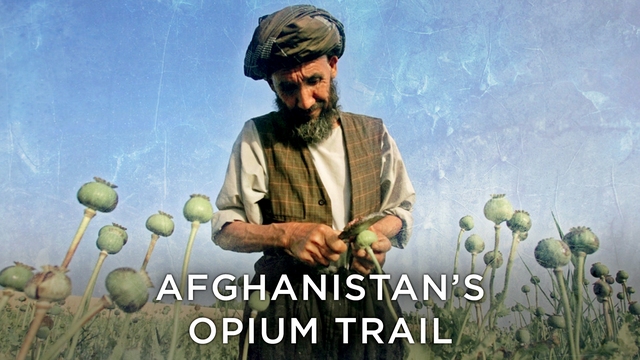Afghanistan's Opium Trail
In this shocking new film we ride the drugs caravan, from cultivation, to process, to market.
 Over 90% of the world's opium now comes from Afghanistan. In this shocking new film, we ride the drugs caravan, from cultivation, to process, to market. On route, we lift the curtain on the hidden world of the drug barons; learn how to process heroin in the crudest of laboratories and encounter deadly gunfights on the Iranian border...
Over 90% of the world's opium now comes from Afghanistan. In this shocking new film, we ride the drugs caravan, from cultivation, to process, to market. On route, we lift the curtain on the hidden world of the drug barons; learn how to process heroin in the crudest of laboratories and encounter deadly gunfights on the Iranian border...
Crouching behind rocks in the mountain passes between Iran and Afghanistan, Iranian guards prepare an ambush. As opium smugglers come into view, the guards open fire. One trafficker falls to the ground immediately, killed by their first shot. But the others fight back until police reinforcements arrive, wielding large machine guns.
Shoot outs like this happen every day. Over 200 Iranian guards are killed a year patrolling the Afghan border. "Drugs production has increased tenfold in Afghanistan", laments Captain Miri. So much opium is flooding across the border, anti-drug units now calculate the value of their hauls in tonnes rather than kilos.
In bleak Afghan villages, the lure of opium cultivation is clear. "What else are we to do", despairs farmer Ahmad Ollah. "We have nothing else, just opium". He's hoping for $40 per kilo for his latest harvest. But it has been a bumper crop for everyone and there is a glut of opium on the market. Despite his pleading, Ollah gets only $34 per kilo from the drug baron's envoys.
Mansur Khan is the man behind the offer. A thick set man with a relaxed air, a tribal ruler with his own personal militia. "I know all this is illegal", he freely admits. "But I employ 400 men who are responsible for the well being of their families". A gulp of vodka for good luck and he packs his smugglers off, laden with several hundred kilos of opium. Khan considers himself invincible. "You have no idea how loyal the natives are to us", he boasts. "Even when it comes to a shoot-out". And there are many of those.
At the start of 500 km trek to Iran, the river Helmand has to be crossed. "It's not easy to travel aboard a raft with a grenade launcher on your shoulder," grumbles one smuggler. At the other side, they join a camel caravan. Then a vehicle convoy meets them, armed with night vision equipment to travel in the dead of night. But things aren't going to plan. The scout radios a warning; "Turn the car around and go another route".
In the Afghan highlands, opium is processed into heroin. A car jack serves as a drug press. "This thing works wonders", croons the lab worker. It's a simple production process: pressing, diluting, heating and pressing again until all the liquid runs out. Child's play. And the only gauge of the purity of this deadly sludge is a quick PH test at the end.
After 30 years of war, Afghanistan is in ruins. Traditionally, the one problem it's never faced is drug addiction. Now, all that is changing. With no future prospects and no sign of things improving, the young are turning to drugs. In the ruins of a burnt out school, junkies smoke spliffs of heroin. "You're ruining your lives", laments the local policeman. But his words are in vain. Tribal structures are being subverted; the young no longer listen to what their elders say. And Afghanistan's economy remains entirely based on drugs.
FULL SYNOPSIS



